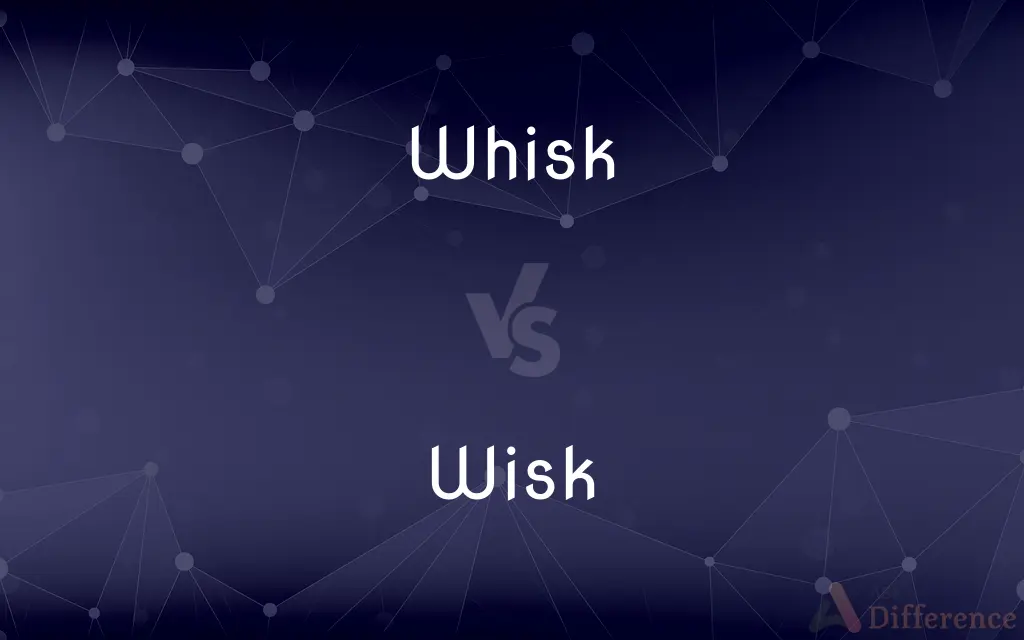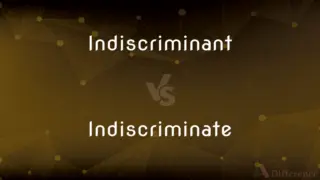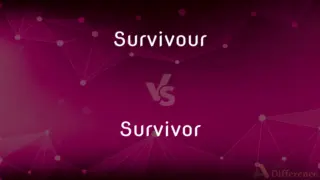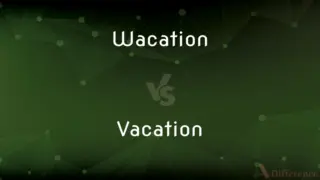Whisk vs. Wisk — Which is Correct Spelling?
By Tayyaba Rehman — Updated on March 18, 2024
Whisk is the correct spelling, while Wisk is incorrect. Whisk refers to a kitchen utensil used for mixing or a swift movement.

Table of Contents
Which is correct: Whisk or Wisk
How to spell Whisk?

Whisk
Correct Spelling

Wisk
Incorrect Spelling
ADVERTISEMENT
Key Differences
Rhyme Scheme: "Wish for a whisk," emphasizing the silent 'h.'
Visual Memory: Picture a whisk with an "h"-shaped handle.
Sound Cue: When you pronounce "whisk," you can subtly hear the "h" sound, unlike "wisk."
Association with Kitchen: Whisk is associated with kitchen utensils; remember the "h" as it's essential in the kitchen.
Comparison: Unlike the brand "Wisk," the tool "whisk" has an "h" in the mix.
ADVERTISEMENT
How Do You Spell Wisk Correctly?
Incorrect: They decided to wisk the batter for the cake.
Correct: They decided to whisk the batter for the cake.
Incorrect: The recipe calls for you to wisk the flour into the mixture slowly.
Correct: The recipe calls for you to whisk the flour into the mixture slowly.
Incorrect: She used a fork to wisk the dressing together.
Correct: She used a fork to whisk the dressing together.
Incorrect: Wisk the eggs until they're frothy.
Correct: Whisk the eggs until they're frothy.
Incorrect: He tried to wisk the sauce to make it smoother.
Correct: He tried to whisk the sauce to make it smoother.
Whisk Definitions
Whisk is a kitchen tool with wire loops, used for stirring and beating.
She used a whisk to beat the eggs.
Whisk denotes transporting someone/something suddenly and quickly.
She was whisked away to the hospital.
Whisk is a rapid sweeping movement.
He made a whisk of his hand, dismissing the idea.
Whisk can mean to brush or sweep away.
He whisked the crumbs off the table.
Whisk is a small bunch of grass, hair, or similar material.
The artist used a whisk of hay in his painting.
A whisk is a cooking utensil which can be used to blend ingredients smooth or to incorporate air into a mixture, in a process known as whisking or whipping. Most whisks consist of a long, narrow handle with a series of wire loops joined at the end.
Take or move (someone or something) somewhere suddenly and quickly
His jacket was whisked away for dry-cleaning
He whisked her off to Paris for a few days
Beat or stir (a substance, especially cream or eggs) with a light, rapid movement.
A utensil for whipping eggs or cream.
A bunch of grass, twigs, or bristles for removing dust or flies.
A brief, rapid action or movement
A whisk round St Basil's cathedral
To move or cause to move with quick light sweeping motions
Whisked crumbs off the table.
Whisked the children away.
To whip (eggs or cream).
To move lightly, nimbly, and rapidly.
A quick light sweeping motion.
A whiskbroom.
A small bunch, as of twigs or hair, attached to a handle and used in brushing.
A kitchen utensil, usually in the form of stiff, thin wire loops attached to a handle, used for whipping foodstuffs.
A quick, light sweeping motion.
With a quick whisk, she swept the cat from the pantry with her broom.
A kitchen utensil, now usually made from stiff wire loops fixed to a handle (and formerly of twigs), used for whipping (or a mechanical device with the same function).
He used a whisk to whip up a light and airy souffle.
A bunch of twigs or hair etc, used as a brush.
Peter dipped the whisk in lather and applied it to his face, so he could start shaving.
A small handheld broom with a small (or no) handle.
I used a whisk to sweep the counter, then a push-broom for the floor.
A plane used by coopers for evening chines.
A kind of cape, forming part of a woman's dress.
(obsolete) The card game whist.
(transitive) To move something with quick light sweeping motions.
Vernon whisked the sawdust from his workbench.
(transitive) In cooking, to whip e.g. eggs or cream.
The chef prepared to whisk the egg whites for the angel's food cake.
(transitive) To move something rapidly and with no warning.
The governess whisked the children from the room before they could see their presents.
(intransitive) To move lightly and nimbly.
The children whisked down the road to the fair, laughing and chattering as they went.
(transitive) To move whiskers.
A game at cards; whist.
The act of whisking; a rapid, sweeping motion, as of something light; a sudden motion or quick puff.
This first sad whiskTakes off thy dukedom; thou art but an earl.
A small bunch of grass, straw, twigs, hair, or the like, used for a brush; hence, a brush or small besom, as of broom corn.
A small culinary instrument made of wire, or the like, for whisking or beating eggs, cream, etc.
An impertinent fellow.
To sweep, brush, or agitate, with a light, rapid motion; as, to whisk dust from a table; to whisk the white of eggs into a froth.
To move with a quick, sweeping motion.
He that walks in gray, whisking his riding rod.
I beg she would not impale worms, nor whisk carp out of one element into another.
To move nimbly at with velocity; to make a sudden agile movement.
A mixer incorporating a coil of wires; used for whipping eggs or cream
A small short-handled broom used to brush clothes
Move somewhere quickly;
The President was whisked away in his limo
Move quickly and nimbly;
He whisked into the house
Brush or wipe off lightly
Whip with or as if with a wire whisk;
Whisk the eggs
Whisk Meaning in a Sentence
To make the perfect omelet, whisk the eggs vigorously before cooking.
She taught her daughter to whisk together oil and vinegar to make a simple dressing.
He forgot to whisk the gravy, and it ended up with lumps.
The chef demonstrated how to whisk the cream until it formed stiff peaks.
For a light and airy pancake, whisk the batter just enough to combine the ingredients.
Before adding to the soup, whisk a little broth into the flour to avoid clumps.
The secret to her light pastries is to gently whisk the dry ingredients before mixing.
When making mayonnaise, slowly whisk the oil into the egg yolks to emulsify.
To make a fluffy meringue topping, whisk the egg whites with sugar until glossy peaks form.
To dissolve the cocoa powder, whisk it with hot water before adding to the cake batter.
To incorporate air, whisk the egg whites in a clean, dry bowl.
To refresh the drink, give it a quick whisk before serving.
In culinary school, they teach you how to whisk properly to incorporate air into batters.
For a smooth chocolate ganache, whisk the cream and chocolate together while warm.
A quick whisk of the dressing ingredients ensures a perfectly emulsified vinaigrette.
After adding the gelatin, whisk the dessert mixture well to ensure it sets evenly.
He learned to whisk egg yolks and sugar to a 'ribbon stage' for his dessert recipes.
Always whisk the marinade well to ensure the flavors are thoroughly combined.
When making custard, constantly whisk the mixture to prevent it from curdling.
Before frying, whisk the batter one more time to ensure it's smooth and lump-free.
She likes to whisk her coffee with a bit of cinnamon for added flavor.
A balloon whisk is the best tool for whisking a large volume of liquid.
She showed him how to whisk the soup to blend the ingredients without a blender.
For the smoothest sauces, whisk continuously over low heat until thickened.
Whisk the matcha powder with hot water to avoid clumps in the tea.
Whisk Idioms & Phrases
At a whisk
At a moment's notice; very quickly.
Ready to leave at a whisk, he kept his bags packed.
Whisk away
To take or move someone or something quickly away from a place.
After the ceremony, the newlyweds were whisked away to their honeymoon destination.
Whisk into shape
To quickly organize or fix something or someone into the desired condition.
The new manager whisked the project team into shape within weeks.
Whisk through
To move quickly through a process or task.
She whisked through the paperwork in no time.
Whisk off
To remove something quickly.
The chef whisked off the cloth to reveal the masterpiece dish.
Common Curiosities
What is the pronunciation of Whisk?
/wɪsk/
Which vowel is used before Whisk?
"I"
What is the verb form of Whisk?
Whisk.
What is the plural form of Whisk?
Whisks.
Which conjunction is used with Whisk?
Any conjunction can be used depending on the sentence structure.
Which preposition is used with Whisk?
Depends on the context; "with" is common (e.g., "beat eggs with a whisk").
Which article is used with Whisk?
Either "a" or "the" based on the context.
What is the root word of Whisk?
The Old Norse word "vísk."
Is Whisk a negative or positive word?
Neutral.
What is the singular form of Whisk?
Whisk.
Why is it called Whisk?
It's derived from Old Norse "vísk," meaning a wisp or tuft.
Is Whisk an abstract noun?
No.
Is Whisk a vowel or consonant?
Consonant.
Is the word Whisk is imperative?
It can be, e.g., "Whisk the eggs."
Is Whisk a noun or adjective?
Noun.
How many syllables are in Whisk?
One.
What is a stressed syllable in Whisk?
The entire word "whisk" is stressed as it's a single syllable.
What is another term for Whisk?
Beater.
Is Whisk an adverb?
No.
What part of speech is Whisk?
Noun and verb.
Is Whisk a collective noun?
No.
How is Whisk used in a sentence?
"He used a whisk to blend the ingredients together."
Is the word Whisk is Gerund?
No.
Is the word “Whisk” a Direct object or an Indirect object?
Can be a direct object, e.g., "She used the whisk."
How do we divide Whisk into syllables?
It's a one-syllable word; no division.
What is the first form of Whisk?
Whisk.
What is the second form of Whisk?
Whisked.
Is Whisk a countable noun?
Yes.
Is the Whisk term a metaphor?
Not inherently, but it can be used metaphorically.
What is the opposite of Whisk?
There isn't a direct opposite, but contextually, "settle" could be considered opposite to the verb form of "whisk away."
Which determiner is used with Whisk?
Commonly "the" or "a," but any determiner can be used based on context.
What is the third form of Whisk?
Whisked.
Share Your Discovery

Previous Comparison
Indiscriminant vs. Indiscriminate
Next Comparison
Survivour vs. SurvivorAuthor Spotlight
Written by
Tayyaba RehmanTayyaba Rehman is a distinguished writer, currently serving as a primary contributor to askdifference.com. As a researcher in semantics and etymology, Tayyaba's passion for the complexity of languages and their distinctions has found a perfect home on the platform. Tayyaba delves into the intricacies of language, distinguishing between commonly confused words and phrases, thereby providing clarity for readers worldwide.













































